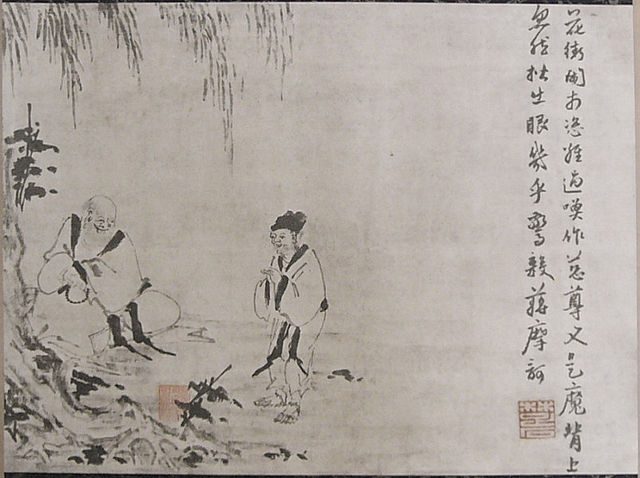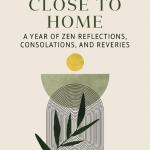
“Deeds of the Zen masters” featuring Hotai
14th century
Among the problems in transmitting Zen along with other Buddhist meditation schools to the west has been frequently the fact it is part of something larger is too often forgotten.
Zen, for instance, has three aspects: First, Zazen and koan introspection, the particular kinds of meditation unique to the Zen schools. Along with that there’s also a teaching about awakening, our true home. These two things are attended to, to greater or lesser degree. But then there’s that third thing, the ethical container. What we call precepts.
Contrary to the solipsistic misunderstanding of Zen Buddhism promulgated here and there, particularly on the web, Zen is not an anarchist’s spiritual dream. One of the first things we find as we begin investigating our selves and our place in this world, is that we do not exist by ourselves. It is not all about me. Never has been.
And to live as if we were is to invite terrible consequences.
Here is an inescapable truth: everything we do has consequences.
So, sometimes, often times, in our headlong rush of living, we need some external guidelines, some generally trustworthy set of rules by which to mark what we’re up to. That full third of the Zen way. The precepts.
In Zen as it is transmitted through Japan there are five, ten, and sixteen versions of the precepts. I find those five the core. The others are important, and can be critical, but to understand the five is to go to the heart of the matter.
Do not kill.
Do not steal.
Do not lie.
Do not misuse your sexuality.
Do not become intoxicated.
Now, if we live only in the realm of rules we are strangled by dead letters. Of course. And not only are our own lives constrained, we become caricatures of our true potentiality.
Preserve life as best you can, respect the boundaries of things, seek the truth of things, respect your body and the bodies of others, seek the clear mind.
So. We also need to recall how we are so profoundly tied up together, how our individual lives, our very intimate personal existence, are each completely woven out of each other. We are more intimate than the words can ever convey. We are all relatives. We are all family. And there are ways to encounter the words do not kill, do not steal, do not lie, do not misuse your sexuality, and do not become intoxicated, that become the living expressions of this intimate dance of life.
Powerful pointers for us.
Me, I find it best to think of the precepts as koans.
The word “koan” has entered our English lexicon as either a “thorny question,” or, sometimes interchangeably with the word “Zen” as a a kind of non sequitur. And, while I don’t personally like these usages, language is like that, mutable, and ever changing.
But, it can also be worthwhile looking to what a koan is in the sense of a spiritual discipline, as part of the Zen project. Not the non sequitur thing, but the great quest for meaning and healing that many human hearts feel tugging at them in the early morning hours.
Koans, in this later sense, are a type of meditative discipline in which one takes a word, or a phrase, a brief anecdote or a fairy tale as an “object of meditation.” Now for it to be a koan this word or phrase or brief anecdote or fairy tale must contain an expression of reality, some sense of the great empty and our creative precious passingness within that great empty. As such the word or phrase or anecdote or fairy tale becomes an invitation to an intimate encounter with a spiritual director, and really, and most importantly, with ourselves.
I think of koans as how we dance with the universe, how we dance with who we truly are.
When a koan is encountered with diligence, creativity and humility, on occasion an intimate understanding of that great empty and the precious passinging individual erupts within the practitioner’s heart and mind. The universe’s dance.
So it should be no surprise how in formal Japanese-derived curriculum koan introspection practice, one, of course, formally encounters the precepts, which are the moral framework of the Zen way. There are many precepts, but, here as I said, I’m thinking specifically of the five core precepts.
There are at least three levels or approaches to anything we encounter in the koan project: the literal, the compassionate and the essential. So, right off, the obvious. There are the words themselves and the meaning they are intended to convey. Here is where we encounter the literal rule. Do not kill. Do not lie. Do not steal. Do not misuse sex. Do not become intoxictated. And so on…
Frankly, there are times we just need the rules. Much of our lives we’re wandering around in the thickets. Haven’t a clue. We’re lost. And the precepts can become a life line thrown out to us. Sometimes we just have to grab that line. Sometimes we just have to follow the rules. To notice when we need each approach is the dance.
Screwing up and starting over is also part of the dance.
Here the precepts open to a way of life that is creative, expressive, and inviting. Learning the precepts is learning the steps to the dance of life.
And, as they say on late night television, wait there’s more.
Each moment of our lives, as we face death, as we open our mouths to speak, as we encounter each “other” in our lives, as we seek intimate moments with another, as try to be clear; each of these events turns out to be a gate. And if we get it, if we notice the gate, what was once a barrier, is thrown open, and we find our way through to a boundless freedom.
And that’s where we find the deepest invitation of precept as koan. Unfortunately this one needs to rest as an assertion and as an invitation…
But it is there, Guanyin’s mercy, the universe itself lurking in the shadows of our actions and thoughts, a divine mugger just waiting for you to walk into the dark places…
Try it, you might not like it, but you’ll be grateful…













